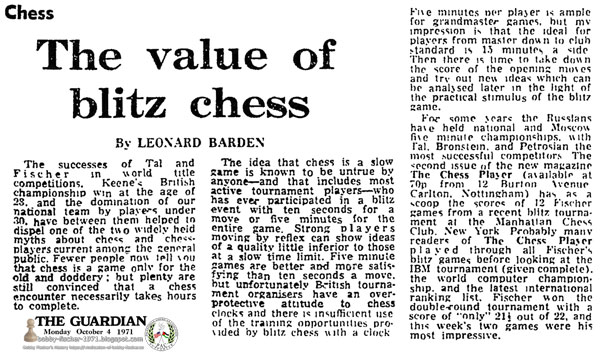The Guardian London, Greater London, England Monday, October 04, 1971 - Page 17
The Value of Blitz Chess by Leonard Barden
The successes of Tal and Fischer in world title competitions, Keene's British championship win at the age of 28, and the domination of our national team by players under 30, have between them helped to dispel one of the two widely held myths about chess and chess players current among the general public. Fewer people now tell you that chess is a game only for the old and doddery; but plenty are still convinced that a chess encounter necessarily takes hours to complete.
The idea that chess is a slow game is known to be untrue by anyone—and that includes most active tournament players—who has ever participated in a blitz event with ten seconds for a move or five minutes for the entire game. Strong players moving by reflex can show ideas of a quality little inferior to those at a slow time limit. Five minute games are better and more satisfying than ten seconds a move, but unfortunately British tournament organizers have an overprotective attitude to chess clocks and there is insufficient use of the training opportunities provided by blitz chess with a clock. Five minutes per player is ample for grandmaster games, but my impression is that the ideal for players from master down to club standard is 15 minutes a side. Then there is time to take down the score of the opening moves and try out new ideas which can be analyzed later in the light of the practical stimulus of the blitz game.
For some years the Russians have held national and Moscow five minute championships, with Tal, Bronstein, and Petrosian the most successful competitors. The second issue of the new magazine The Chess Player (available at 70p from 12 Burton Avenue Carlton, Nottingham) has as a scoop the scores of 12 Fischer games from a recent blitz tournament at the Manhattan Chess Club, New York. Probably many readers of The Chess Player played through all Fischer's blitz games before looking at the IBM tournament (given complete), the world computer championship, and the latest international ranking list. Fischer won the double-round tournament with a score of “only” 21½ out of 22, and this week's two games were his most impressive.
Robert James Fischer vs Andrew Soltis Manhattan blitz (1971) (blitz), New York, NY USA, rd 1, Aug-08 Sicilian Defense: Lasker-Pelikan. Sveshnikov Variation (B33) 1-0 https://www.chessgames.com/perl/chessgame?gid=1044359 Paul Brandts vs Robert James Fischer Manhattan blitz (1971) (blitz), New York, NY USA, rd 2, Aug-08 King's Indian Defense: Orthodox Variation. Classical System Misc. Lines (E98) 0-1 https://www.chessgames.com/perl/chessgame?gid=1044706























